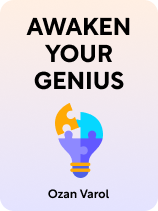

This article is an excerpt from the Shortform book guide to "Awaken Your Genius" by Ozan Varol. Shortform has the world's best summaries and analyses of books you should be reading.
Like this article? Sign up for a free trial here.
Is your mind constantly bombarded with other people’s thoughts? How can you regain control over your media consumption?
In today’s digital age, we’re inundated with a constant stream of information. From social media to news outlets, the quality of content we consume often lacks depth and originality. This flood of low-quality information can hinder our ability to think deeply and develop our own ideas.
Read on to discover Ozan Varol’s tips for thoughtful media consumption that will help you reconnect with your true self.
Controlling Your Media Consumption
Varol argues that, in the digital age, you’re constantly tuned into others’ thoughts. You probably don’t go very long without consuming various forms of media, which consists of other people’s ideas. Additionally, Varol says the quality of the ideas you’re consuming is likely poor. Social media, news outlets, and entertainment often prioritize sensationalism and quick gratification over depth and originality. This flood of low-quality content can crowd out the space and time needed for deep thinking, reflection, and the development of your own ideas. You can’t access your true self when you’re preoccupied with others’ superficial selves.
(Shortform note: Psychologists have a term for the kind of non-stop media consumption that Varol describes: information overload. According to experts, humans evolved to seek and consume information for survival. But in the digital age, we’re surrounded by information, and it’s so easily accessible that we now have difficulty tolerating boredom. This means that we consume information all the time—not just for survival, but also for entertainment or pure stimulation. (This explains why we don’t always choose high-quality media: Sometimes we just want to be comforted, not transformed.) But constant consumption leads to information overload—our brains can only process so much data, and surpassing that limit negatively affects cognition.)
Varol offers three tips you can use to stop your media consumption from distracting you from your true self.
#1: Consume Media Intentionally
According to Varol, you likely turn to certain forms of media impulsively, not intentionally—for example, you might scroll through social media whenever you’re bored. Take some time to consider the impact this has on your well-being—you might find that you waste a lot of time and energy on media that doesn’t help you. You might even find that it harms you by taking a toll on your mental health. This knowledge may motivate you to become more intentional about your media consumption.
(Shortform note: If you find that you can’t seem to stop or moderate your media consumption even though it’s hurting you, you may be suffering from technology addiction, according to Adam Alter in Irresistible. Alter argues that much modern technology is designed to be addictive, which drives some people to consume copious amounts of media—for example, he says this explains the popularity of the true crime genre. If you struggle with technology addiction, introducing intentionality might not be as simple as Varol makes it sound. However, there are many options for recovery from technology addiction—finding the right treatment plan could help you regain control of your media consumption.)
#2: Choose High-Quality Media
Varol says that you should choose reflective, longform media like books and documentaries over lower quality media like news, podcasts, and social media. The former tend to contain ideas worth serious consideration, while the latter are designed to grip your attention and keep you focused on frivolous things, like what your college roommate ate for lunch.
(Shortform note: Although Varol says books and documentaries are higher quality than news, podcasts, and social media, this rule may not always apply. Consider that some books may be objectively bad and yet still valuable, or at least enjoyable. Similarly, some documentaries may promote bad science, lies, or indefensible biases. And although Varol says news, podcasts, and social media are relatively worthless, each may have its place in life: News can alert you to important events in real time, podcasts can offer in-depth explorations of niche topics or provide diverse perspectives through interviews with experts, and social media can connect you with communities sharing common interests and even improve your mental health.)
#3: Create Space to Do Nothing
Varol argues that instead of allowing others’ thoughts to flood your brain all day, you should create quiet moments that enable you to explore your own thoughts. During this time, you should do nothing—resist the urge to be productive and let your mind wander instead.
(Shortform note: In Do Nothing, journalist Celeste Headlee notes that doing nothing activates a brain network called the default mode network, which allows for processing, reflection, and creative thinking. She also explores several strategies you can use to embrace unproductive time. For example, maximizing your productivity at work can help you get your work done faster, leaving you with more opportunities to do nothing.)
Exercise
- Consider how your current media consumption habits impact your ability to think independently. For example, is your mind too crowded with others’ ideas for you to come up with your own, as Varol suggests?
- How can you tailor your media consumption to promote your own authenticity, originality, and creativity? For example, maybe you need to consume less media overall or consume only high-quality media.

———End of Preview———
Like what you just read? Read the rest of the world's best book summary and analysis of Ozan Varol's "Awaken Your Genius" at Shortform.
Here's what you'll find in our full Awaken Your Genius summary:
- The reasons why you’ve abandoned your true self so far in life
- A former rocket scientist’s tips for embodying your true self
- How to achieve creative fulfillment and personal growth






